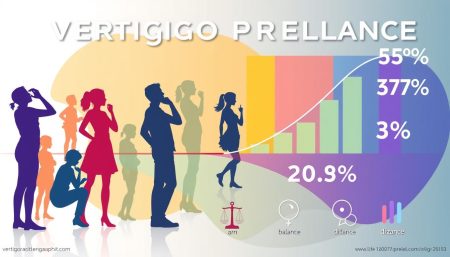Vertigo can make your world spin out of control in a flash. It feels like you’re spinning or everything around you is moving, even when it’s not. Knowing what causes vertigo is key for those who deal with it.
Vertigo can stem from inner ear problems or other health issues. For some, just moving their head can trigger an episode. Others might get vertigo due to serious health conditions. Spotting these triggers is the first step to managing and maybe even preventing vertigo attacks.
In this guide, we’ll look at the usual causes of vertigo and the symptoms that come with them. We hope to help you understand and cope with this tough condition better.
Understanding Vertigo: A Comprehensive Overview
Vertigo is a complex condition that affects millions of people worldwide. This overview explores its definition, impact, and common misconceptions. It aims to provide a clear picture of what can trigger vertigo and its effects on daily life.
Defining Vertigo vs. Dizziness
Vertigo is often confused with general dizziness, but they’re distinct sensations. Vertigo creates a false sense of spinning or movement. Dizziness is a broader term for feeling unsteady. Knowing the difference is crucial for identifying vertigo triggers and treatment options.
The Impact on Daily Life
Vertigo can significantly disrupt everyday activities. Simple tasks like walking, driving, or even standing up can become challenging. Many people struggle with work, social interactions, and personal care during episodes. Understanding these impacts helps in developing effective vertigo treatment strategies.
Common Misconceptions About Vertigo
Several myths surround vertigo, leading to misunderstandings about its causes and treatment. Let’s debunk some common misconceptions:
| Misconception | Reality |
|---|---|
| Vertigo only affects older adults | It can occur at any age |
| Vertigo is always caused by inner ear problems | Multiple factors can trigger vertigo |
| Vertigo is untreatable | Many effective treatments exist |
By understanding what can trigger vertigo and dispelling these myths, individuals can better manage their condition. Recognizing vertigo triggers and exploring treatment options are key steps toward improving quality of life for those affected by this challenging condition.
What Can Trigger Vertigo: Essential Facts to Know
Vertigo attacks can happen without warning, making you feel like you’re spinning. Knowing what might cause them is important for managing vertigo. There are many things that can trigger an episode, from common to rare causes.
Problems in the inner ear are a big reason for vertigo. Issues like BPPV, Meniere’s disease, and vestibular neuritis can cause sudden dizziness. These problems mess with your ear’s balance, making you feel like you’re moving when you’re not.
But it’s not just the ear that can cause vertigo. Medical conditions like migraines, multiple sclerosis, and some strokes can also lead to vertigo. It’s important to know these possible causes to get the right treatment.
- Head position changes
- Dehydration
- Stress and anxiety
- Certain medications
- Motion sickness
Even the environment can trigger vertigo. Changes in altitude, like when flying or climbing mountains, can upset your balance. Even simple actions like looking up quickly or rolling over in bed can trigger an episode for some people.
Knowing what triggers your vertigo is crucial. By avoiding these triggers, you can lessen how often and how bad vertigo attacks are. This can greatly improve your life quality.
Inner Ear Disorders as Primary Vertigo Triggers
Inner ear disorders are a major cause of vertigo. They mess with the balance system in our ears, causing spinning and dizziness. Let’s look at three common inner ear problems that lead to vertigo.
BPPV (Benign Paroxysmal Positional Vertigo)
BPPV happens when tiny calcium crystals in the inner ear move out of place. This makes the brain think you’re moving, even if you’re not. It causes short, sudden vertigo spells, especially when you move your head. The Epley maneuver can fix this by moving the crystals back into place.
Meniere’s Disease
Meniere’s disease is when fluid builds up in the inner ear. It leads to vertigo attacks, hearing loss, and ringing in the ears. While there’s no cure, diet changes and medicines can help. Cutting down on salt and avoiding caffeine are common ways to ease symptoms.
Labyrinthitis and Vestibular Neuritis
These are inflammatory conditions that affect the inner ear and its nerves. They’re often caused by viruses. Symptoms include severe vertigo, nausea, and trouble balancing. Rest and exercises to improve balance are key to getting better.
| Disorder | Main Symptoms | Common Triggers | Remedies |
|---|---|---|---|
| BPPV | Brief vertigo spells | Head movements | Epley maneuver |
| Meniere’s Disease | Recurring vertigo, hearing loss | Fluid buildup | Diet changes, medications |
| Labyrinthitis/Vestibular Neuritis | Severe vertigo, balance issues | Viral infections | Rest, vestibular exercises |
Medical Conditions That May Cause Vertigo
Vertigo can be caused by many medical conditions. Knowing what can trigger vertigo is important for managing it. Let’s look at some health issues that may cause vertigo.
Migraine-Related Vertigo
Migraines are more than just headaches. They can also cause vertigo. This vertigo often comes with sensitivity to light and sound. Managing migraine-related vertigo usually involves medication and lifestyle changes.
Multiple Sclerosis
Multiple sclerosis (MS) can affect balance and cause vertigo. The disease damages nerve fibers, leading to dizziness and spinning sensations. Managing MS-related vertigo focuses on treating the disease and relieving symptoms.
Stroke and TIA
Strokes and transient ischemic attacks (TIAs) can disrupt blood flow to the brain, causing vertigo. These events need immediate medical attention. Long-term vertigo management after a stroke may include physical therapy and medication.
| Condition | Vertigo Symptoms | Management Approaches |
|---|---|---|
| Migraine | Spinning sensation, light sensitivity | Medication, stress reduction |
| Multiple Sclerosis | Dizziness, balance issues | Disease-modifying drugs, balance exercises |
| Stroke/TIA | Sudden vertigo, other neurological symptoms | Immediate medical care, rehabilitation |
Knowing these medical conditions can help identify vertigo triggers. If you have persistent vertigo, see a healthcare professional. They can help find the cause and suggest the right treatment.
Environmental and Lifestyle Triggers
Understanding what triggers vertigo can help manage symptoms. Many factors in our environment and daily habits can cause vertigo. This can really affect our quality of life.
Diet is key in managing vertigo. Some foods and drinks can make symptoms worse. Here are some common vertigo triggers:
- Caffeine
- Alcohol
- High-sodium foods
- Processed foods
- Chocolate
Sleep patterns also play a big role. Not getting enough sleep or having irregular schedules can lead to vertigo. Sticking to a regular sleep routine can help.
Environmental stimuli can also trigger vertigo. Bright lights, loud noises, and strong smells can be triggers for some. Knowing what these are and avoiding them can help.
| Environmental Factor | Potential Impact | Management Strategy |
|---|---|---|
| Bright lights | May induce dizziness | Use dimmer switches, wear sunglasses |
| Loud noises | Can cause disorientation | Use earplugs, avoid noisy environments |
| Strong odors | May trigger nausea, vertigo | Improve ventilation, use air purifiers |
Weather changes, especially changes in barometric pressure, can also trigger vertigo. Keeping up with weather forecasts and preparing can help lessen the impact of these triggers.
Medication-Related Vertigo Episodes
Understanding vertigo and its triggers is key for those who experience it. Medications can trigger vertigo episodes. Both prescription and over-the-counter drugs can cause vertigo symptoms. It’s important to know their effects.

Prescription Drugs
Some prescription drugs can cause vertigo as a side effect. These include:
- Antidepressants
- Blood pressure medications
- Anti-seizure drugs
- Some antibiotics
If you’re taking these and experience vertigo, talk to your doctor. They can help find other options or adjust your treatment.
Over-the-Counter Medications
Common over-the-counter drugs can also cause vertigo. Examples include:
- Aspirin
- Antihistamines
- Sleep aids
- Decongestants
Be careful with these drugs, especially if you’re prone to vertigo. Always read labels and follow the dosage instructions.
Drug Interactions
Combining multiple medications can lead to vertigo symptoms. This happens when drugs interact, making side effects worse or creating new ones. Keep a list of all your medications and share it with your doctor to avoid dangerous interactions.
Knowing about these medication-related vertigo triggers helps you work with your doctor. Together, you can reduce the risk of episodes and manage symptoms better.
Recognizing Early Warning Signs
Spotting vertigo symptoms early can greatly help in managing it. Knowing what to look for lets you act quickly and find the right treatment. Let’s look at some important signs to watch for.
Sudden dizzy spells or feeling like the room is spinning are classic signs. You might also feel unsteady on your feet or have trouble walking straight. Some people report nausea or vomiting with these episodes. If you notice these signs, it’s time to pay attention.
Other warning signs include:
- Ringing in the ears
- Hearing loss
- Headaches
- Sweating
- Vision changes
If you experience new confusion, slurred speech, or severe vertigo, seek medical help right away. These could point to more serious issues.
Keep a diary of your symptoms. Note when they happen and what you were doing. This can help spot patterns and identify your personal vertigo triggers. With this info, you and your doctor can create a tailored treatment plan.
Remember, early detection is key. By recognizing these warning signs, you can take control of your vertigo and improve your quality of life.
Physical Activities and Movement Triggers
Physical activities and movements can trigger vertigo. Knowing these triggers helps manage vertigo symptoms. Let’s look at how different movements affect vertigo.
Head Position Changes
Sudden head position changes can trigger vertigo. This is common in people with inner ear disorders. Simple actions like looking up or bending down can cause dizziness.
Exercise-Related Triggers
Exercise can sometimes trigger vertigo. Activities with rapid head movements or body position changes are more likely to cause issues. Here are some exercises that may trigger vertigo:
- Yoga poses that involve head inversions
- High-intensity interval training
- Spinning or cycling classes
- Certain swimming strokes
Travel and Motion Sickness
Travel can be tough for those with vertigo. Motion sickness during car rides, flights, or boat trips often leads to vertigo-like symptoms. The constant movement can disrupt balance.
| Travel Mode | Potential Vertigo Triggers | Possible Remedies |
|---|---|---|
| Car | Winding roads, Stop-and-go traffic | Focusing on a stable point, Ginger supplements |
| Airplane | Takeoff and landing, Turbulence | Staying hydrated, Pressure-equalizing earplugs |
| Boat | Rough seas, Engine vibrations | Looking at the horizon, Acupressure wristbands |
By recognizing these triggers, individuals can prevent or manage vertigo symptoms. It’s important to work with a healthcare provider to develop strategies for dealing with vertigo in various situations.
Stress and Anxiety-Induced Vertigo
Stress and anxiety can cause vertigo. When you’re stressed, your body’s fight-or-flight response is triggered. This affects your balance system, showing how complex vertigo triggers and management can be.

Emotional stress can tighten muscles, especially in the neck and shoulders. This tightness can block blood flow to the inner ear. This might lead to vertigo episodes. Those dealing with chronic stress or anxiety may find themselves more prone to dizziness and vertigo.
“Understanding the link between stress and vertigo is crucial for effective management of symptoms.”
To manage stress-related vertigo triggers, try these:
- Practice deep breathing exercises
- Try progressive muscle relaxation
- Engage in regular physical activity
- Prioritize quality sleep
- Seek professional help if needed
By tackling stress and anxiety, you might reduce vertigo episodes. It’s key to work with healthcare pros to create a vertigo management plan that fits your needs.
Prevention Strategies and Management Techniques
Understanding vertigo triggers and treatment starts with prevention. Making smart lifestyle choices can help. Stay hydrated and eat a balanced diet to keep your inner ear healthy.
Lifestyle Modifications
Simple daily changes can greatly help manage vertigo. Avoid sudden head movements and get enough sleep. Limit alcohol and caffeine too.
Regular exercise, like yoga or tai chi, strengthens your vestibular system. This can reduce vertigo symptoms.
Environmental Adjustments
Creating a vertigo-friendly environment is key. Keep your spaces well-lit to prevent falls. Remove tripping hazards like loose rugs.
Use nightlights for nighttime bathroom trips. At work, adjust your computer screen to eye level. This reduces neck strain and vertigo triggers.
Exercise and Physical Therapy
Specific exercises can be powerful remedies for vertigo. The Epley maneuver treats BPPV. Vestibular rehabilitation therapy retrain your brain for better balance.
These exercises, done regularly, can improve your life. They can also reduce vertigo episodes.
FAQ
Q: What are the most common triggers for vertigo?
A: Vertigo can be caused by inner ear problems like BPPV, Meniere’s disease, and labyrinthitis. It can also be triggered by migraines, multiple sclerosis, and sudden head movements. Certain medications and stress or anxiety can also play a role.
Q: How can I differentiate between vertigo and general dizziness?
A: Vertigo makes you feel like you’re spinning or the world is moving. Dizziness is more like feeling lightheaded or unsteady. Vertigo often comes with nausea and trouble balancing.
Q: Can lifestyle changes help prevent vertigo episodes?
A: Yes, making lifestyle changes can help prevent vertigo. Try to sleep regularly, manage stress, avoid trigger foods, drink plenty of water, and do balance exercises as advised by a doctor.
Q: Are there any specific exercises that can help with vertigo?
A: Yes, exercises like the Epley maneuver and Brandt-Daroff exercises can help with BPPV. Vestibular rehabilitation therapy, which includes balance and eye movement exercises, can also help many types of vertigo.
Q: Can stress and anxiety really cause vertigo?
A: Yes, stress and anxiety can trigger or worsen vertigo. The vestibular system, which controls balance, is linked to the body’s stress response. Chronic stress or anxiety can affect blood flow and muscle tension, leading to vertigo.
Q: What should I do if I experience a sudden onset of vertigo?
A: If vertigo hits suddenly, sit or lie down in a safe spot. Keep your head still and avoid sudden movements. If symptoms don’t go away or are severe, get medical help right away. It could be a sign of something serious like a stroke.
Q: Can certain foods or drinks trigger vertigo?
A: Yes, some foods and drinks can trigger vertigo. Caffeine, alcohol, salty or sugary foods, and MSG are common culprits. Reducing salt intake may help manage symptoms for those with Meniere’s disease.
Q: How long do vertigo episodes typically last?
A: Vertigo episodes can last from seconds to hours or even weeks. BPPV episodes are usually short, while Meniere’s disease attacks can last longer. Untreated vertigo may last for days or weeks.
Q: Are there any over-the-counter medications that can help with vertigo?
A: Some over-the-counter medications like antihistamines (e.g., dimenhydrinate or meclizine) can help with vertigo. But, always talk to a healthcare provider before taking any medication, as they can have side effects or interact with other drugs.
Q: Can changes in weather or barometric pressure trigger vertigo?
A: Yes, weather changes or barometric pressure shifts can trigger vertigo in some people. This is common in those with vestibular migraines or inner ear disorders. Keeping a symptom diary can help identify if weather changes are a personal trigger.


















